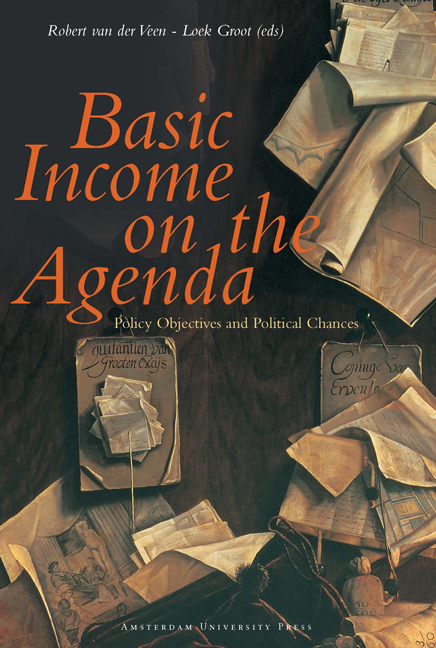European Basic Income or the Race to the Bottom:Why Politicians Might Come to Think the Unthinkable
Published online by Cambridge University Press: 23 January 2021
Summary
Introduction
Over the last fifteen years the debate around basic income has been organized around abstract blueprints for wholesale reform of the fiscal-welfare system. This is reflected in the radical-utopian discourse of the post-industrial and post-Keynesian left (e.g. Fitzpatrick, 1996). But it is also evident in the self-consciously ‘feasible’ scenarios modelled by liberal economists (e.g. Parker, 1989). The latter work has involved close scrutiny of the possible impact of institutional and administrative details of such models on incentives, labour participation rates, redistributive effects and the various poverty traps associated with existing welfare regimes.‘Feasible’ here refers to technical-institutional changes centring on the integration of taxation and welfare, which though radical could, with enough political will, be adopted and integrated as the public sector platform for the wider market economy without major disruption and without necessarily altering the fundamentals of this wider socio-economy. For this reason such modelling invariably adopts the yardstick of revenue-neutrality, emphasizing the technical nature of proposed changes and distancing them from any intrinsic relationship with wider political projects relating to social justice or environmental sustainability.
In consequence, basic income research within academia has produced a steady flow of economic models and policy scenarios which re-shuffle parameters such as territorial scale, unit of assessment and entitlement, generosity and conditionality, to useful effect. Combined with the parallel discussion around the philosophical and ethical implications of basic income (e.g. Van Parijs, 1992a), this debate has brought much needed intellectual clarity and specificity. However, perhaps unsurprisingly, this growing conceptual sophistication has had little impact on politicians and the wider policymaking community. Intellectual clarity does not flow naturally into a plausible political project. Protagonists have been very good at envisioning arrivals and destinations.The debate has offered few clues to the points of departure and the politics of transition.
How then can basic income be made relevant? How can the basic income paradigm engage with contemporary socio-economic dynamics, and perhaps more importantly, political perceptions of those dynamics? In what circumstances might basic income become a common sense – or at least a mainstream – representation of both a set of social problems and an orientation towards resolving them?
If basic income politics is to move forward, we need a more opportunistic and pragmatic approach vis-à-vis important questions relating to funding, conditionality and the political-institutional context.
- Type
- Chapter
- Information
- Basic Income on the AgendaPolicy Objectives and Political Chances, pp. 170 - 185Publisher: Amsterdam University PressPrint publication year: 2000



